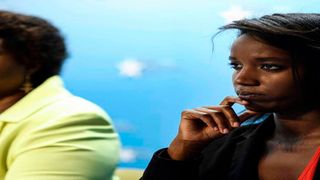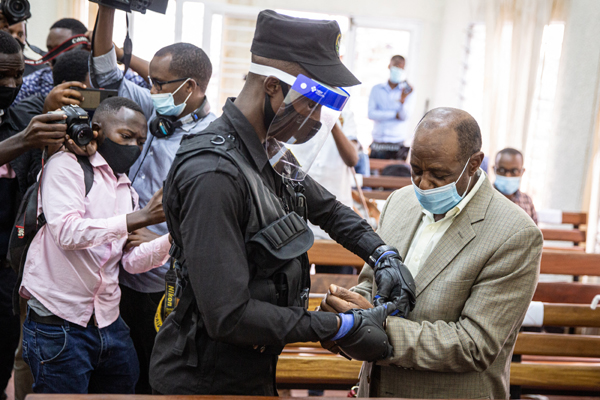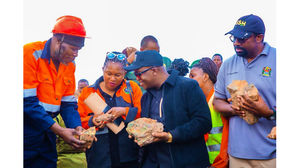
Taciana Rusesabagina (left), Paul Rusesabagina's wife, and his daughter Carine Kanimba speak during a press conference in Brussels on September 21, 2021.
| File | Kenzo Tribouillard | AFPAfrica
Prime
From hero to convict: Rusesabagina's life story defies 'Hotel Rwanda' movie plot
When Paul Rusesabagina, 66, starts serving his 25-year jail sentence, it is unlikely that the court of public opinion on whether he is a victim of a political vendetta or a terrorist will have closed its case.
To many Rwandans, an example has been made of him to deter others who support rebel groups.
In the eyes of the West, the man who became a film ‘hero’ for his (sometimes disputed) tale of saving more than 1,200 people during the Rwandan genocide has been dragged through political mud by a government he criticised.
For instance, Sophie Wilmes, Belgium’s deputy prime minister and foreign minister, claimed Mr Rusesabagina “did not benefit from a fair and equitable trial; particularly with regard to the rights of the defence”.
“The presumption of innocence was not respected either. These elements, de facto, call into question the trial and the judgment.”
In response, Rwanda cancelled a planned meeting between Ms Wilmes and Rwandan foreign minister Vincent Biruta on the sidelines of the UN General Assembly.
“The victims of terrorist acts of the FLN (the military wing of the rebel group he formed), admittedly less famous, have just as much right to justice as Mr Rusesabagina and his co-defendants,” the Rwandan ministry said on Monday.
Rusesabagina had Belgian citizenship and was also a permanent resident of the US. Washington said the trial process had shown violations, suggesting that Rwanda use the experience to improve in the future.
“We urge the Government of Rwanda to take steps to examine these shortcomings in Mr Rusesabagina’s case and establish safeguards to prevent similar outcomes in the future,” said Ned Price, a spokesman for the US Department of State.
Foreign collaboration
When Rwanda sought to nail Rusesabagina, it was the Belgians and Americans who provided much of the evidence prosecutors used to convict him in the High Court Chamber for International and Cross-Border Crimes. And when his rebel group attacked Rwanda, the West issued travel advisories on the country.
A statement from Kigali on Monday lampooned Belgium as reflecting “the contempt shown by the Government of the Kingdom of Belgium towards the Rwandan judicial system since the start of this trial, despite the significant contribution of relevant Belgian institutions to the investigation of this case.”
The court convicted him for founding “a terrorist organisation that attacked Rwanda, [and] he financially contributed to terrorist activities,” according to a verdict by Rwandan judge Beatrice Mukamurenzi, who heard the trial for seven months.
Rusesabagina had denied being a terrorist, although he had, long before the trial, admitted to supporting rebel movements opposed to Rwandan President Paul Kagame through the Movement for Democratic Change (MRCD). The court said on Monday that MRCD could not be de-linked from the FLN.
In one video in December 2018, he told his supporters in a New Year’s message to “speed up the liberation struggle,” widely seen as a call to rally against President Kagame.
“Rwandan people can no longer stand the quality and all kinds of ill treatment directed to us by the RPF regime,” he said, referring to the ruling party - Rwanda Patriotic Front, which emerged as a political party after victory in 1994 and which stopped the genocide.
“Time has come for us to use any means possible to bring about change in Rwanda as all political means have been tried and failed. It is time to attempt our last resort hence I plead my unreserved resort that our youth, the National Liberation Forces [NLF], launches attacks against the Kagame army in order to free the Rwandan people.”
When the Rwandan Investigation Bureau (RIB) presented him to the public for the first time in August last year, the officers said they had arrested him through international cooperation. Rwanda labelled him a founder, leader, sponsor and member “of violent, armed, extremist terror outfits including MRCD and PDR-Ihumur, operating out of various places in the region and abroad”.
Johnston Busingye, then Rwanda’s attorney-general and minister for justice (now Rwandan High Commissioner to the UK), accused him of “wreaking terror on Rwandans” and vowed to bring to justice “those suspected of masterminding, sponsoring or financing terror against Rwandans”.
In court, where Rusesabagina was absent, the judge said there had been more than 90 people who sought reparations and compensation for losses suffered as the FLN launched attacks in 2018 and 2019.
They lost family and friends or got injured or lost homes, the judge said.
Prosecutors filed evidence seized from Rusesabagina’s home in Belgium, with the assistance of Brussels and Washington.
Hotel Rwanda
Born on June 15, 1954, Rusesabagina was raised in the former Murama commune in Gitarama, the southern province of Rwanda. He went to a Seventh-day Adventist school and studied theology in college, but he went straight into the hotel business afterwards.
Rusesabagina was a quiet employee of a hotel in Kigali before the genocide. According to the film Hotel Rwanda, as a moderate Hutu, he reportedly saved many Tutsis by hiding them in the hotel rooms.
The story is disputed by some, who argue that he didn’t have that kind of influence with the then Hutu regime that was targeting Tutsis.
A hero in the film, Rusesabagina did not even turn up for its screening in Kigali in 2004. Signs of trouble had begun then, and another run of irony. Here was a man who had saved many and initially became a friend of the new ruling party, RPF, only to fall out with it. Rusesabagina fled the country to Belgium, from where he gave the story that inspired the movie.
In August last year, he was bundled onto a plane in Dubai and brought to Kigali. He reportedly thought he was flying to neighbouring Burundi, his lawyers claimed.
Human rights groups joined his family in accusing Rwanda of “kidnapping” him. His daughter said on Monday the verdict mattered less because his rights had been violated by kidnapping.
Human Rights Watch, too, said the trial was flawed and “overpowered by political influence”.
“Rwandan authorities have the right to prosecute genuine security offenses, but they have undermined their case every step of the way, starting with the manner in which they unlawfully detained Paul Rusesabagina, through multiple violations of the right to a fair trial,” said Lewis Mudge, Central Africa director at HRW.
Rwanda’s government spokesperson, Yolande Makolo, rejected the criticism, arguing that Kigali followed all relevant laws.
“Paul Rusesabagina's arrest on an outstanding warrant for terrorism and related offences complied with all domestic and international laws, and he has since received a fair and transparent trial along with 20 co-accused of the FLN armed group, which he led,” she told the Nation.
Denied bail
Despite reportedly freeing people from harm, as the film portrayed the events, Rusesabagina never saw freedom during his trial. His lawyers tried three times to have him granted bail. All were rejected as he was seen as a flight risk and that the crimes he faced were grave.
In fact, his lawyers had filed a motion at the Rwanda High Court Chamber for International Crimes arguing for the cancellation of proceedings in his case and for his immediate release on the grounds that his fundamental rights were violated by the Rwandan government.
He needed access to international lawyers, pens and paper, phone calls to lawyers and family and adequate time to prepare for trial. The Belgian Embassy in Kigali, lawyers had told the court, had provided medicine for his heart condition, but Kigali confiscated it. He himself had initially rejected these group of lawyers given to him by the state.
Prosecutors had wanted 67 years or a life sentence for him. The judge reduced it to 25, given he was a first-time offender.
He will serve time with Callixte Nsabimana, the former spokesperson of FLN. He had alleged in a previous court hearing that Rusesabagina was getting financial support from a (former) Zambian president to support rebel forces against the Rwandan government. Zambia denied this accusation.
Another co-accused is Herman Nsengimana, who served as FLN spokesperson until his arrest in January last year.





